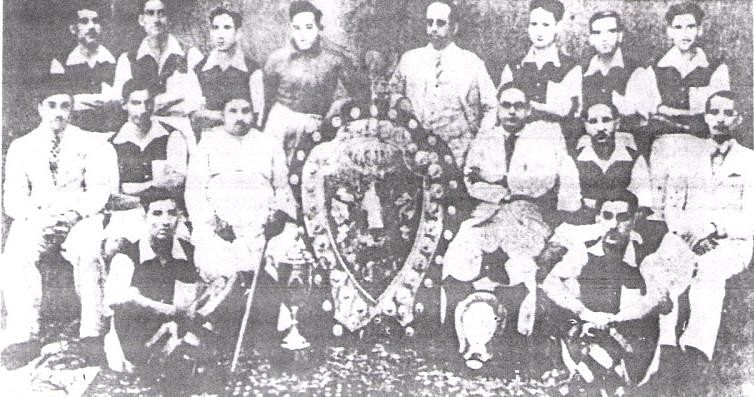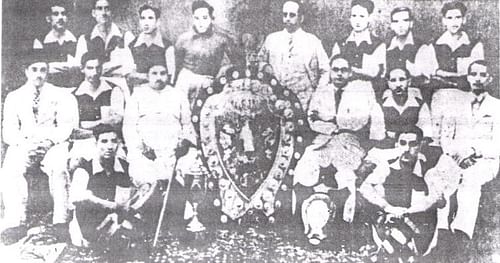
Looking back at Mohammedan Sporting's historic Durand Cup triumph

In what was a matter of nationalistic and sectarian pride besides sporting victory, the Mohammedan Sporting Club is hailed in Indian football history as the first civilian club to win the Durand Cup and deservingly so, when they beat the Royal Warwickshire Regt 2-1.
After the suspension of Durand Cup for a year due to the Second World War, the 1940 edition of the much respected tournament known to be gilded with military precision saw a first - the very much Indian Mohammedan Sporting Club clinched the top honours after defeating the Royal Warwickshire Regiment 2-1. Ironically, this has remained the club's only Durand victory ever since, albeit their appearances in 3 other finals in later years.
Asia's oldest football tournament had started as an inter-regimental football tournament played in Simla and recorded wins of British military regiments stationed in India. Earlier, The East India Railways lost the final 0-1 to the York & Lancaster Regt in 1927. Unpredictably enough, when the tournament was shifted to Delhi in 1940, the Calcutta-based Black Panthers sprung up a pleasant surprise to be the first ever civilian team to lift the coveted trophy.
Mohammedan Sporting won the Calcutta Football League five times in a row
The pride was Mohammedan SC's, a club that had been winning the Calcutta Football League for five years in a row from 1934 to 1938. Logically, if the stronghold of the regimental teams had to be broken, it had to be one of the Big Three of Calcutta- Mohun Bagan, East Bengal or Mohammedan Sporting. The many victories of the MSC were a reason to celebrate for the Muslims of the sub-continent, otherwise marginalised and facing penury, except for the elite few.
Thus, the common Muslims' aspirations were also linked to the team's fortunes and it did well enough to spread the cheer in its 'golden era' i.e. the 1930s and early 1940s which also saw it win the IFA Shield and Calcutta League, the first Indian team, to achieve these distinctions. Club official C.A. Aziz can rightly be credited with building a team that would make winning seem like child's play and the first that would attract talent from all over the region to the pulse of football, Calcutta.
Since early in the 1930s, he inducted players with a foresight which was very modern for football in those days, including such methods as picking Mohun Bagan rejects and attracting players from all over the subcontinent (sometimes in a call for religious duty), thereby gradually weaving together a diversely cosmopolitan team that would soon gather accolades.
The stars of the team
The team line up of yore is stuff of legend in the hearts of the faithful and had the likes of full backs 'Wall' Juma Khan from Peshawar and Bachi Khan from Quetta, Taj Mohammed, Nasim, Noor Mohammed, Saboo, Mohiuddin, Masum, Aqueel Ali, Rahmat, Rahim, ace centre forward Rashid from Ajmer, Samad, Noor Mohammed Jr. and goalkeeper Osman Jan (an import from Delhi's Crescent Club and considered one of the 'best keepers in one on one situations').
Even so, the Mohammedan team's aura in the 1930s was one that surrounds the unbeatable. Juma Khan's partnership with Taj Mohammed gave the team an impregnable defence. Centre half Noor Mohammed was indispensable for his strong tackles in the field. Bachi Khan was known for rough play while the attack comprising of the trio- Rahim, Rashid and Rahmat were a bane for opponents' defence.
The Durand final at the Irwin amphitheatre, Delhi on the 12th of January, 1940 was witnessed by over a hundred thousand people including Muslim elite and politicos who came from all parts of the subcontinent (Dacca, Bhopal, Hyderabad and Calcutta). It was officiated by, in another first, an Indian referee, Capt Harnam Singh who experienced a pre-match scare when British linesmen, Warrant Officers Oliphant and Greene refused to officiate under an Indian officer.
A court martial threat by the then Viceroy, Lord Linlithgow helped to persuade the errant linesmen to take up their duties in a manner Capt Singh described later as 'competent and fully cooperative'. Centre forward Hafiz Rashid and inside left Saboo scored the winning goals, a victory that was a proper conclusion to the triumph-studded decade for Mohammedan and ensured a boost for the Muslim separatist movement, what with the winning team consisting of 11 Muslim players.
That same season, after Masum led the club to the Durand Cup success, they defeated Bangalore Muslims 1-0 in the Rovers Cup and had the unique distinction of claiming both titles in the same season. Understandably, Sporting rose in stature to become one of the most fiercely popular clubs in those days, something that continues to the present day despite the lack of quality performances.